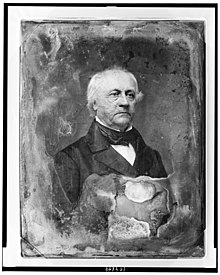William Alexander Duer
| William Alexander Duer | |
|---|---|
 |
|
| 7th President of Columbia University | |
|
In office 1829–1842 |
|
| Preceded by | William Harris |
| Succeeded by | Nathaniel Fish Moore |
| Personal details | |
| Born |
September 8, 1780 New York City |
| Died | May 30, 1858 (aged 77) New York City |
| Spouse(s) | Hannah Maria Denning |
| Parents |
William Duer Catherine Alexander |
| Relatives |
John Duer (brother) William Duer (nephew) William Denning (father-in-law) Lord Stirling (grandfather) |
William Alexander Duer (September 8, 1780 – May 30, 1858) was an American lawyer, jurist, and educator from New York City. He was a president of Columbia University, then Columbia College.
He was the son of William and Catherine Alexander Duer. His brother John Duer was a New York lawyer and jurist. His nephew William Duer, the son of John Duer, also served in Congress. He studied law in Philadelphia, and with Nathaniel Pendleton in New York.
During the quasi-war with France in 1798 he obtained the appointment of midshipman in the navy, and served under Stephen Decatur. On the adjustment of the French question, he resumed his studies with Pendleton, and was admitted to the bar in 1802.
He engaged in business with Edward Livingston, who was then district attorney and mayor of New York, and, after moving to New Orleans, formed a professional partnership with his brother-in-law, Beverley Robinson. About this time he contributed to a partisan weekly paper called the Corrector, conducted by Peter Irving in support of Aaron Burr. Duer shortly afterward joined Livingston at New Orleans, and studied Spanish civil law. He was successful, but, owing to the climate and to his marriage with the daughter of William Denning, a prominent whig of New York, he was induced to resume practice in the latter city.
In New York, he contributed literary articles to the Morning Chronicle, the newspaper of his friend Peter Irving. He next opened an office in Rhinebeck, and in 1814 was elected to the New York State Assembly, where he was appointed chairman of a committee on colleges and academies, and succeeded in passing a bill, which is the original of the existing law on the subject of the common-school income. He was also chairman of the committee that arranged the constitutionality of the state law vesting the right of navigation in Livingston and Robert Fulton, and throughout his service bore a prominent part in promoting canal legislation.
...
Wikipedia
